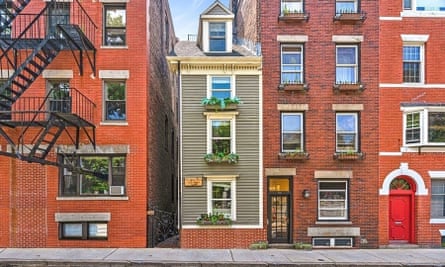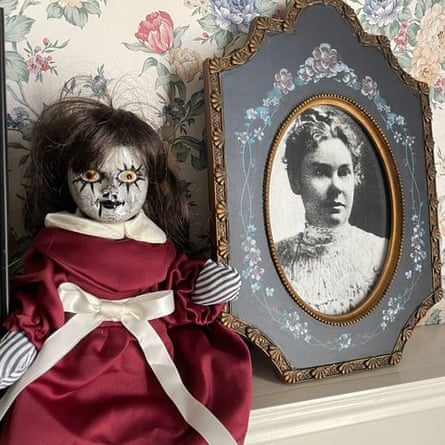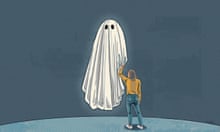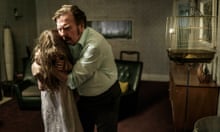In Boston’s Little Italy, where tourists juggle coffee and cannoli, there is a 10ft-wide monument to revenge on the market that could be yours for $1.2m.
It’s a spite house.
An unusual architectural phenomenon, the property was built not with hope and love, but with venom and machiavellian planning, with the intention of irritating the neighbours.
It was reportedly built in 1862 and was the product of a feud between two brothers who inherited land from their father. When one brother returned from the civil war, he found his battle-shy sibling had constructed his own home on the lion’s share, leaving him a plot measuringabout 400 sq ft.
In retaliation, he erected the four-storey home – directly in front of his brother’s, so that it blocks light and the view.
“You see that section of jagged wall?” says Vito, the realtor selling the property. “That’s what’s left of the first brother’s house. We know who won.”

A property is considered “stigmatised” by the National Association of Realtors (NAR) if it is “psychologically impacted by an event which occurred, or was suspected to have occurred, on the property, such event being one that has no physical impact of any kind.”
A building may be stigmatised because of a feud like the Boston house or a death. The building could be the former site of meth lab, the home of a cult or in some areas, a place that is allegedly haunted.
While roughly half the states in the US operate under some form of caveat emptor, Latin for “buyer beware”, putting the due diligence on the purchaser, the other half obligate sellers to disclose “stigmas”, or void the sale.
“It’s complicated,” said Deanne Rymarowicz, NAR associate counsel. “A seller can be subject to a law … that’s completely different to the town next door.”
As of 2019, at least nine states have death disclosure laws, according to Zillow. The strictest, California, requires mention of deaths in the last three years. In South Dakota, a seller must reveal if a murder took place. In Texas, that’s not necessary.
Minnesota and Massachusetts, home of 17th-century witch trial city Salem, tell sellers they don’t need to disclose any paranormal happenings, but New Jersey requires them to confess if asked.
New York is the only state where, in some circumstances, it’s illegal to sell a haunted house, thanks to the 1991 “Ghostbusters ruling”. It started in 1989, when the Ackley family put their five-bedroom 1890s home in Nyack, New York, up for sale.
Unbeknown to buyer Jeffrey Stambovsky, the family had a history of discussing paranormal activity in the building, including their daughter’s bed rattling, and were once interviewed by Reader’s Digest. After making his down payment, Stambovsky was told by the agent, and decided to sue.
Remarkably, the case made it all the way to the New York supreme court’s appellate division, which voted three to two in his favour, rescinding the sale.
The new law made it illegal to conceal if a building had been marketed as “haunted”, because it could negatively affect the value. The late Justice Israel Rubin wrote: “As a matter of law, the house is haunted.”
While 40% of Americans supposedly believe in ghosts, according to YouGovAmerica, inking it into law is unusual.
“Whether the buyer believes in the paranormal is sometimes irrelevant,” said Randall Bell, who was once called “Dr Disaster” and is considered to be the US’s top property damage economist and expert on “stigmatised” buildings. He estimates that if a murder took place in a house, it can cause a 10- to 25% loss in value.
“I know of a property in Jersey where [a family] bought a house where there had been a murder, which didn’t bother them, but they neglected to think about its reputation. It wrecked birthday parties, barbecues … all the things people do to make new friends,” he told the Guardian.
In other words, ghosts aren’t the problem, humans are.
A harrowing example is the Watcher House. In 2014, the Broaddus family bought a 1905 home in Westfield, New Jersey, for $1.4m and shortly after, frightening letters began to arrive.
One said: “I am The Watcher. Bring me your young blood.”
They sued the previous owners, who reportedly also received letters, but New Jersey’s laws have fewer protections for buyers of stigmatised properties than New York, less than 10 miles away. They lost.
After years of fear, broken neighbourly relationships and failed police investigations, theBroaddus family accepted a $440,000 loss when they sold in 2019. Netflix bought the rights to their story.
Another family who suffered a similar experience spoke on condition of anonymity, out of fear of “small-town America”.
One member of the family said: “I lived that nightmare. What happened to my family was overwhelming. The reality is the people who sold us the house didn’t tell us the truth and got away with it. If it happened in New York … we would have gotten our money back. As it is, it nearly destroyed us. The laws are so obtuse and unfair.”
There are few federal laws governing the sale of stigmatised buildings, but in the 1980s, buyers were prevented from suing if someone died in the home from Aids. Last year the NAR advised that properties should not be “stigmatised” by Covid-19.
A big problem, realtors say, is the internet makes it difficult for events to fade from memory, so that some owners resort to demolishing their homes or changing its address to try to outsmart Google.
However, not all haunted homes lose money.
The Ackley Ghostbusters house was sold by the singer Matisyahu for $1.8m in March, 160% higher than the local average. And in May, a bed and breakfast and museum in Fall River, Massachusetts, where Lizzie Borden was accused of murdering her parents with a hatchet in 1892, sold for $2m.

Buyer Lance Zaal, founder of US Ghost Adventures, said: “It isn’t scary. It can be an advantage, from a business perspective.”
Along with themed shot glasses and a souvenir doll, the tour company offers “romantic” stays where couples sleep in the rooms where bodies were found, on beds scattered in rose petals.
He added: “We have a new feature where you can pay to leave an axe under someone’s pillow.”








